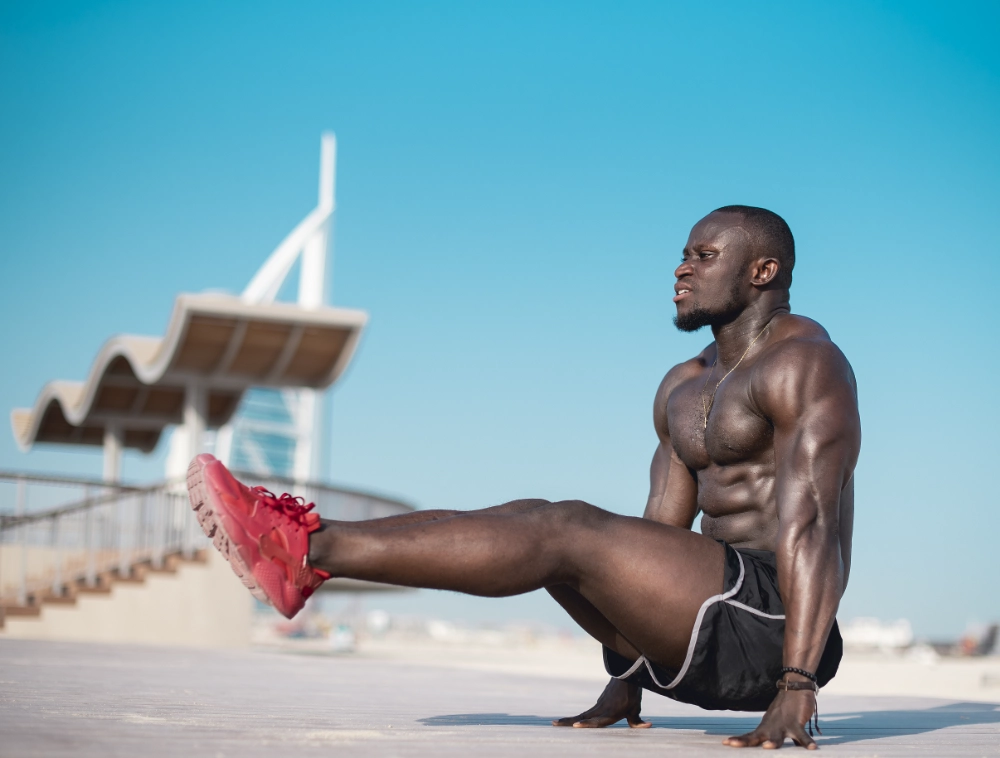Personal trainer in Dubai: Imagine swapping your desk job for a career where you get paid to help people crush their goals, all while soaking up the sun in one of the world’s most glamorous cities. Sounds like a dream, right? Well, if you’re eyeing Dubai as your launchpad into personal training, you’re in for a treat – or should I say, a sweat session with a view of the Burj Khalifa. But let’s be real: it’s not all Instagram-worthy workouts on the beach.
Build your own dreams, or someone will hire you to build theirs.
Farrah Gray
Becoming a personal trainer in Dubai requires smarts, certifications, and a dash of hustle. As a sports science graduate with over 14 years of hands-on experience training everyone from busy execs to elite athletes, I’ve seen the highs (tax-free paychecks) and the hurdles (that desert heat is no joke). In this guide, I’ll walk you through everything you need to know to turn your passion into a thriving career in Dubai’s exploding fitness scene.
Why Dubai? The Ultimate Playground for Personal Trainers
Dubai isn’t just about skyscrapers and supercars – it’s a fitness hotspot on steroids. As of 2025, the UAE health and fitness club market is valued at around USD 484 million, projected to hit USD 743 million by 2033 with a steady 4.37% CAGR. That’s huge growth, driven by a health-conscious population that’s increasingly ditching sedentary lifestyles. Demand for personal trainers? Sky-high. With over 75 major gym facilities dominating 60% of the market, there’s room for independents too, especially as residents prioritize wellness post-pandemic.
What makes it irresistible? Tax-free income – yes, you keep every dirham you earn. Average starting salaries hover around AED 4,000-5,000 monthly, but experienced pros can pull in AED 16,000 or more, with top earners hitting AED 184,000 annually. Plus, Dubai’s expat-heavy vibe means diverse clients: think high-net-worth individuals from all over the world, blending cultures in your sessions. But here’s a pro tip from my years here – respect cultural sensitivities. Modest attire during training, especially with female clients, goes a long way in building trust. Dubai’s fitness culture mixes luxury (think high-end gyms) with outdoor vibes, like yoga on Jumeirah Beach.
Looking ahead, 2025 trends are all about tech: AI coaching, VR workouts, and holistic recovery programs. If you’re into that, Dubai’s your lab – gyms here are early adopters, making it easier to stand out.

Looking to hire a personal trainer in Dubai? Check out our comprehensive guide: Unleash Your Potential: The Ultimate Guide to Finding the Best Personal Trainer in Dubai for tips on choosing the right trainer who fits your goals and lifestyle.
Quick and easy access to the content they’re after is more important for your website users than a… visually-stunning design.
Building Your Foundation: Qualifications and Certifications
Alright, let’s get to the nuts and bolts – or should I say, dumbbells and diplomas. You can’t just waltz into a Dubai gym and start spotting squats; you need creds that scream “expert.”
Start with a Level 3 Personal Training Diploma. This bad boy covers anatomy, physiology, nutrition basics, program design, and client motivation. It’s built on a Level 2 Gym Instructor foundation, so many packages bundle them. Expect 3-5 weeks for intensive courses or flexible blended learning. Why Level 3? It’s the minimum for credibility, and studies show supervised training like this boosts client results by up to 20% in strength and adherence.
Next, join REPs UAE – the gold standard for pros here. They don’t accept online-only quals, so pick accredited providers like Active IQ or YMCA Awards. Registration needs your cert, CV, first aid/CPR, and a photo. Once in, rack up 10 CPD points yearly to stay sharp – think workshops on sports nutrition or rehab.
Boost your edge with add-ons: A nutrition cert lets you craft meal plans backed by science, like balancing macros for optimal performance. First aid is non-negotiable – many jobs demand it. Specialize in niches like pre/post-natal or injury rehab; research shows tailored programs improve outcomes dramatically. In my experience, these extras turned casual clients into loyal fans.

Getting Legal: Visas, Licenses, and Business Setup
Bureaucracy in Dubai? It’s like a workout – challenging but rewarding. First, sort your visa. For freelancers, the freelance visa is king: Submit your passport (valid 6+ months), certs, health insurance, and references. It gives flexibility to train anywhere. Employed? Your gym sponsors it via the Ministry of Labour. Investor visa if you’re starting big.
Register your business: Free zones like Fujairah Creative City offer 100% ownership, no audits, and quick setup – perfect for home/online training. Mainland licenses allow broader ops but might need a local sponsor. Choose “Sports Coaching Services” as your activity.
Don’t skip the license from the General Authority of Sports (GAS). Submit your application, passport copy, photos, REPs-approved Level 3 cert, and CPR/first aid. It’s categorized by your quals level. Finally, get liability insurance – it protects against mishaps and screams professionalism.
Proceed without this? Bad idea – fines await. But nail it, and you’re set for tax-free bliss.
Your Career Path: Freelance Freedom or Employed Stability?
Deciding between freelance and employed is like choosing HIIT or yoga – both work, but pick what fits your vibe.
| Aspect | Freelance Pros | Freelance Cons | Employed Pros | Employed Cons |
|---|---|---|---|---|
| Income | Higher potential (AED 8,000-12,000+/month with clients) | Inconsistent, handle expenses | Steady salary (AED 4,000-5,000 base + commissions) | Capped earnings |
| Flexibility | Set your schedule, train anywhere | Self-marketing required | Structured hours, gym provides clients | Less autonomy |
| Growth | Build your brand, unlimited scalability | Visa/setup hassle | Mentorship, professional development (200+ hours/year in top gyms) | Limited independence |
| Setup | Freelance permit via DDA (2 days processing) | Competition for clients | Easier entry, gym handles paperwork | Contract restrictions |
From my 14 years, I started employed for stability – think big chains like Fitness First – then went freelance for freedom. Freelancers: Get your permit, license, and insurance; employed folks, polish that CV with REPs creds.
Show Me the Money: Earnings Potential in Dubai
Money talks, especially tax-free. In 2025, entry-level PTs earn AED 4,000-5,000 monthly, mid-career AED 8,000-10,000, and top dogs AED 15,000+ (up to AED 184,000 yearly). Location matters: Jumeirah pays AED 5,649 average, while Ajman lags at AED 2,893.
Factors? Experience (newbies start low, vets command more), specializations (rehab pros charge premium), and structure (freelancers earn via sessions: AED 350-600 each). Boost it: Offer packages like group sessions or online coaching. In my career, adding sports-specific training doubled my rates – science backs it, as targeted programs yield better adherence.
For trainers looking to stand out, offering specialized fitness services: rehabilitation, sports-specific training, or wellness coaching, can be a game-changer. Learn more about Specialized Fitness & Personal Training in Dubai and how these tailored approaches can elevate your training business.
Branding Like a Boss: Attracting and Retaining Clients
In Dubai’s competitive market, your brand is your superpower. Start with a niche – weight loss? Strength? Postnatal? Build a mobile-friendly website optimized for “personal trainer in Dubai” searches. Highlight testimonials and services.
Social media is about the people! Not about your business. Provide for the people, and the people will provide for you.
Matt Goulart
Social media? Instagram reigns: Post transformations, Reels on workouts, and engage with 3-5 posts weekly. Paid ads target fitness fans – I’ve seen client demand spike 30% in weeks. Network at events or partner with influencers. Go virtual for flexibility – lower rates, broader reach.
Cultural tip: Be sensitive – use inclusive language, respect Ramadan fasting in programs. Offer free intros to hook clients.
Mastering the Craft: Key Skills and Continuous Growth
Earning your certification is just the beginning, the real growth happens on the gym floor, session after session. In Dubai’s fast-evolving fitness market, where clients expect world-class service and quick results, mastering your craft goes beyond knowing exercise science. It’s about combining technical precision, communication, adaptability, and lifelong learning.
1. Technical Excellence: Build Smarter, Not Harder
A strong foundation in anatomy, biomechanics, and program design separates good trainers from great ones. Every client is different, a 45-year-old executive recovering from back pain needs a completely different plan from a 25-year-old athlete prepping for a triathlon. Learn to design evidence-based, personalized programs that align with your client’s goals, abilities, and limitations. Studies show that personalized training improves client outcomes by up to 20% and that’s exactly what keeps them coming back.
Stay updated on emerging fitness science. The industry is shifting toward data-driven programming, think wearable integrations, body composition analysis, and AI-assisted performance tracking. Dubai gyms are early adopters of tech, so knowing how to use these tools gives you a major competitive edge.
2. Communication and Coaching Psychology
You’re not just a fitness trainer, you’re a motivator, a listener, and sometimes even a therapist. How you communicate matters as much as what you program. Learn to read people: some clients respond to high-energy motivation, others prefer calm, supportive guidance. Cultural sensitivity is also key in Dubai’s diverse environment; respect personal boundaries, language barriers, and local etiquette.
Empathy and emotional intelligence are what build loyalty. Clients stay when they feel understood, not just trained.
3. Continuous Professional Development (CPD)
The best personal trainers never stop learning. The UAE’s REPs system requires annual CPD points, but don’t treat that as a checkbox, use it as an opportunity to evolve. Attend workshops on corrective exercise, nutrition, injury prevention, or new training modalities like functional movement screening and recovery science.
Consider advanced specializations such as:
- Pre/Postnatal Training – growing demand among Dubai’s expat community.
- Rehabilitation & Mobility – highly valued by older clients and those recovering from injuries.
- Sports Performance Coaching – a niche that appeals to athletes and fitness-driven executives.
4. The Power of Personal Branding and Self-Reflection
Skill development isn’t just about the body, it’s about building your professional identity. Record your sessions (with client consent), analyze your coaching style, and gather feedback. This helps you refine your approach and build authenticity in your brand.
I’ve personally logged hundreds of CPD hours over the years, and it’s always paid off, not just in results, but in confidence. The more you learn, the more value you bring to your clients.

Navigating Hurdles: Challenges and Pro Tips
Dubai’s fitness industry might look glamorous from the outside, but it’s not without challenges and knowing how to navigate them early on makes all the difference. From visa delays to fierce competition and financial pressure during the first few months, every trainer goes through a period of testing before success begins to snowball.
The Freelance Grind vs. The Gym Route
One of the biggest decisions you’ll face is whether to freelance or work under a gym. Both paths can lead to success, but each comes with its own hurdles. Freelancing offers freedom, higher earning potential, and control over your schedule. It also demands patience, savings, and a thick skin. You’ll need to invest in marketing, client acquisition, and often your own visa and insurance. The first few months can be slow and financially tight, but once you build a loyal client base, the payoff can be substantial.
Working for a gym, on the other hand, provides structure and stability, especially for newcomers to Dubai. Most gyms offer trainers housing allowances, transportation, and sometimes even basic medical insurance. The hours can be long, but it’s a great way to build credibility, get consistent clients, and learn how the local fitness market operates. Many of the most successful freelance trainers in Dubai actually started in gyms, using that experience as a springboard to build their personal brand and independent business later on.
Overcoming Everyday Obstacles
Administrative hurdles are part of the process too. Visa approvals can take time, so prepare your documents early and double-check your certification recognition with the UAE’s relevant authorities. The climate is another challenge, Dubai’s summer heat is no joke. Schedule outdoor sessions early in the morning or late in the evening; otherwise, you’ll find yourself melting faster than your client’s fat burn rate.
Competition is intense, but the solution isn’t to compete with everyone, it’s to stand out. Specialize. Maybe it’s mobility training for office professionals, fat-loss programs for women, or strength training for executives. The narrower your niche, the stronger your appeal.
Experience Speaks
A client of mine, a new expat from Europe, landed a position at a high-end gym in just two months simply by networking actively on LinkedIn and attending local fitness events. Another started freelancing right away, struggled for the first half-year, but eventually built a thriving business through word of mouth and social proof. My own journey wasn’t easy either, I juggled freelance work while slowly building my reputation. It took time, but consistency always wins.
Dubai rewards those who show resilience, adaptability, and hustle. Whether you’re working within a gym or building your own brand from scratch, every rep – literal or metaphorical – gets you closer to success.
Wrapping It Up: Your Dubai Fitness Empire Awaits
Dubai’s fitness industry is booming and it’s not slowing down. Becoming a personal trainer in Dubai means entering one of the most vibrant, opportunity-filled markets in the region. From luxury gyms in Downtown Dubai to boutique studios across the Marina, world-class Bodybuilding Gyms like Binous, fitness has become a lifestyle statement, and those who can deliver results are in high demand. With more residents prioritizing wellness and holistic living, the potential to grow a rewarding, impactful career has never been greater.
Your journey starts with education and certification, but it doesn’t end there. In Dubai, the best trainers are those who adapt, innovate, and continuously learn. Embrace new technologies, explore specialized training methods, and connect with clients both online and offline. Build a brand that stands for authenticity, expertise, and results, one that speaks to Dubai’s diverse, global community.
As the market surges toward USD 1 billion with a steady 6% annual growth rate, this is your time to rise. Be the trainer who not only transforms bodies but changes lives. Push beyond the basics, inspire confidence, and make your mark on a city that thrives on excellence. Whether you’re training executives at sunrise or hosting bootcamps by the beach, your impact can be profound and your success limitless.
What qualifications do I need to become a personal trainer in Dubai?
To work as a personal trainer in Dubai, you need at least a Level 3 Personal Training Diploma that’s recognized by REPs UAE (Register of Exercise Professionals). This ensures your certification meets local standards. Accredited providers include Active IQ, YMCA Awards, NASM, and ISSA (with REPs endorsement). You’ll also need valid First Aid and CPR certification. For higher credibility, consider extra qualifications in nutrition, pre/postnatal training, or rehabilitation.
How much can a personal trainer earn in Dubai in 2025?
Earnings vary depending on experience, location, and employment type. In 2025, entry-level trainers earn around AED 4,000–5,000 per month, while experienced freelance trainers can make AED 10,000–18,000+ monthly. Top-tier professionals in luxury gyms or with celebrity clients can exceed AED 184,000 annually. Factors like specializations, client retention, and online coaching services can significantly boost your income potential.
Do I need a license to work as a personal trainer in Dubai?
Yes. Personal trainers in Dubai must hold a valid license issued by the General Authority of Sports (GAS) or an approved local body. You’ll need to submit your REPs-recognized certification, passport copy, photos, First Aid certificate, and proof of insurance. Freelancers also need a freelance visa and trade license, while employed trainers are typically sponsored by their gym. Working without the proper license can result in fines or deportation.
Is it better to work freelance or be employed as a personal trainer in Dubai?
Both paths have advantages. Freelancing offers higher earning potential, flexibility, and independence but it requires patience, savings, and marketing skills to build a client base. Employment provides stability, housing or transport benefits, and a steady flow of clients, making it ideal for newcomers. Many trainers start employed, gain experience, and later transition into freelance for greater freedom and income.
How long does it take to become a certified personal trainer in Dubai?
If you’re starting from scratch, it typically takes 6–12 weeks to complete a recognized Level 3 Personal Training Diploma, depending on the course structure and study pace. Afterward, registering with REPs UAE and applying for your work or freelance license can take an additional 1–3 weeks. Altogether, expect around 2–3 months from training to being fully licensed and ready to work.








